Samsung SSD XP941 Review: The PCIe Era Is Here
by Kristian Vättö on May 15, 2014 12:00 PM ESTRandom Read/Write Speed
The four corners of SSD performance are as follows: random read, random write, sequential read and sequential write speed. Random accesses are generally small in size, while sequential accesses tend to be larger and thus we have the four Iometer tests we use in all of our reviews.
Our first test writes 4KB in a completely random pattern over an 8GB space of the drive to simulate the sort of random access that you'd see on an OS drive (even this is more stressful than a normal desktop user would see). We perform three concurrent IOs and run the test for 3 minutes. The results reported are in average MB/s over the entire time.
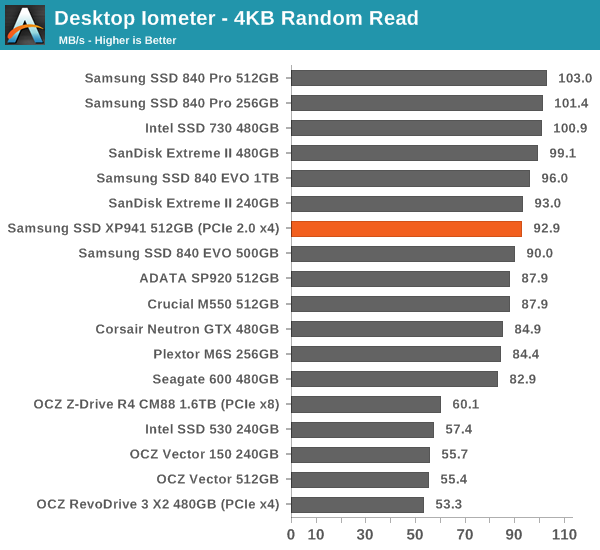
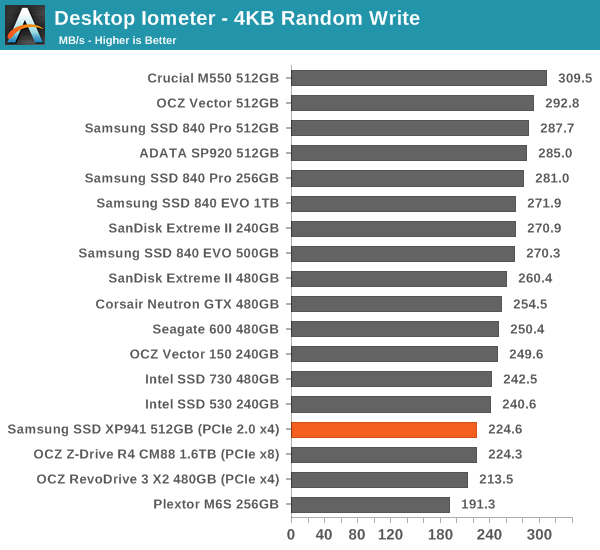
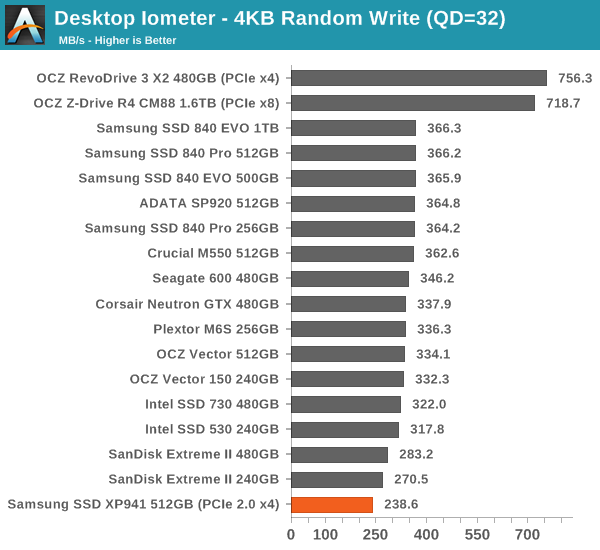
The random performance of XP941 doesn't stand out. Especially random write speeds are quite low by today's standards and queue depth scaling is close to non-existent. That said, I don't believe that high queue depth performance is really important for client workloads as our internal workload analysis shows that even under heavy use the average queue depth tends to be no more than 5. Our Storage Benches also show that even though the random performance isn't excellent, the strong sequential performance thanks to the faster PCIe interface makes up for the difference.
Sequential Read/Write Speed
To measure sequential performance we run a 1 minute long 128KB sequential test over the entire span of the drive at a queue depth of 1. The results reported are in average MB/s over the entire test length.
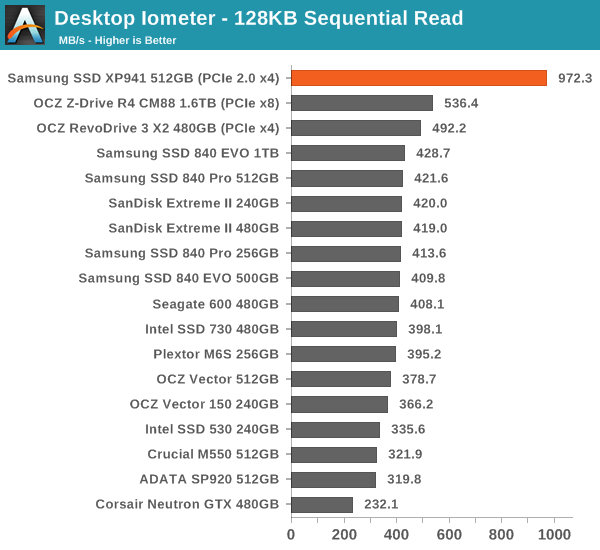
The sequential speeds are the highest we have ever tested in a consumer SSD. Even the 8-controller Z-Drive R4 behemoth can't beat the XP941, which really speaks for the efficiency of a single controller design. If you were to increase the queue depth, the Z-Drive would easily beat the XP941 since higher queue depth would increase parallelism and the Z-Drive could take advantage of all of its eight controllers. However, I was able to reach speeds of up to 1560MB/s with the XP941 at queue depth of 32, which is pretty much as fast as you can go with PCIe 2.0 x4 without tweaking any settings (the PCIe bus can be overclocked to achieve even higher speeds, though there can be a negative impact on random performance. We will investigate this at a later date).
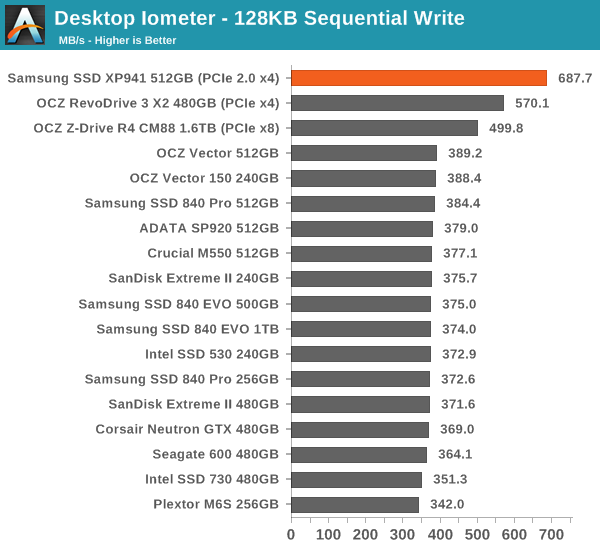
AS-SSD Incompressible Sequential Read/Write Performance
The AS-SSD sequential benchmark uses incompressible data for all of its transfers. The result is a pretty big reduction in sequential write speed on SandForce based controllers. The XP941 does brilliantly in AS-SSD as well but now the strength of eight controllers starts to show for the Z-Drive. Even then, the XP941 is still about twice as fast as the fastest SATA 6Gbps SSD.
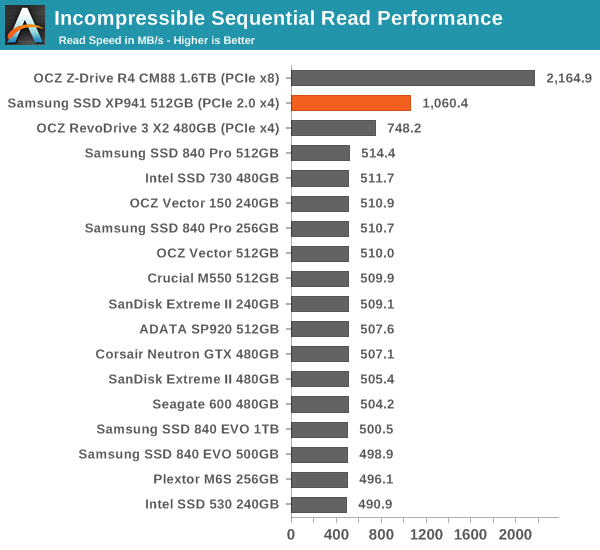
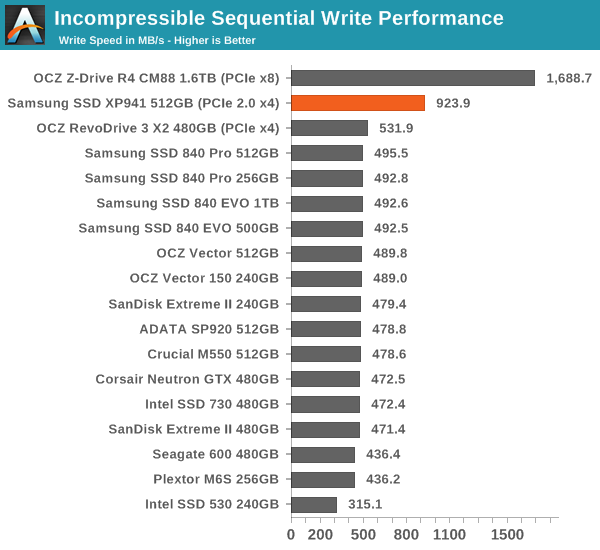










110 Comments
View All Comments
TelstarTOS - Saturday, May 17, 2014 - link
like basroil said.Shadowmaster625 - Thursday, May 15, 2014 - link
They need to stop being greedy. Compared to Samsung's own SSD 840 Pro, it has less parts, so it should cost them less to produce it. Yet the price is double? That makes it a pointless product, especially if it cant even beat an 840 pro at random I/O.dstarr3 - Thursday, May 15, 2014 - link
First generation product on a mostly new interface. There's some R&D to be paid for.JohnBooty - Thursday, May 15, 2014 - link
It's a niche first-gen product, with R&D costs. If ten or twenty engineers, testers, and managers spend a year on this that's easily a few million dollars in R&D right there. Probably more in the tens of millions of R&D, all told.nathanddrews - Thursday, May 15, 2014 - link
People still think this way?JeffFlanagan - Thursday, May 15, 2014 - link
On the Internet you can find people who think in any way possible, or don't think at all. No matter how insane, foolish, and disconnected from reality a belief is, there are hundreds or thousands of people who will believe it. See the countless Republican fake outrages and religion as extreme examples of the phenomena.purerice - Thursday, May 15, 2014 - link
JF, keep politics and gender studies professors' talking points out of this, please. Up till then you had a good point.darwinosx - Thursday, May 15, 2014 - link
You just told us your own political opinions silly boy.Anyway
Apple has been using PCIE SSD's for two generations of Macs now which oddly was not mentioned in this article. Samsung and I think Toshiba have been making them for Apple which probably explains why this one booted from a Mac.
yaedon - Thursday, May 15, 2014 - link
@JF: A well-respected tech blog like Anandtech is no place to vent your opinions of politics or religion. There are plenty of political and religious blogs available on the internet if you feel compelled to discuss those topics.critical_ - Thursday, May 15, 2014 - link
@purerice & @yaedon: I've never understood the desire to squelch these comments in a nation that values free speech. If you don't like it then don't read it (and don't respond).